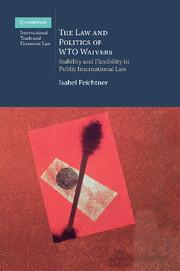Book contents
- Frontmatter
- Contents
- Acknowledgements
- 1 Why study the WTO waiver?
- Part I The stability/flexibility challenge in public international law and particularly the WTO
- 2 The stability/flexibility challenge in public international law
- 3 The WTO – public law of conflict management
- Part II The practice and law of waivers
- Part III The potential of waivers to address the stability/flexibility challenge in international law
- Bibliography
- Index
- References
3 - The WTO – public law of conflict management
Published online by Cambridge University Press: 05 December 2011
- Frontmatter
- Contents
- Acknowledgements
- 1 Why study the WTO waiver?
- Part I The stability/flexibility challenge in public international law and particularly the WTO
- 2 The stability/flexibility challenge in public international law
- 3 The WTO – public law of conflict management
- Part II The practice and law of waivers
- Part III The potential of waivers to address the stability/flexibility challenge in international law
- Bibliography
- Index
- References
Summary
To state the obvious: no consensus exists – neither on the WTO's object-ives, nor the role and function of law in the WTO. While some see free trade as the main objective, others propose a conceptualization of the WTO as aiming to render domestic decision-making more inclusive, possibly even more democratic. The function of WTO law is described at one end of the spectrum as securing efficient exchanges between members, at the other as providing for a constitution that protects individual autonomy against members’ governments.
In this section I wish to juxtapose different conceptions of WTO law and its objectives and to give reasons for my own view that WTO law should be conceptualized as a body of public law which aims at a legitim-ate balance between competing societal interests, trade interests as well as other socio-economic interests. From the perspective of WTO law as a body of public law with the objective of reconciling competing socio-economic interests, I shall formulate the flexibility demands which may be directed towards WTO law as it currently stands. Once it is acknowledged that the main function of WTO law lies in managing conflicts between competing societal interests it becomes clear that the law cannot be treated as merely an instrument to achieve certain substantive objectives such as trade liberalization, but that the legal form itself constitutes an important value: on the one hand as an authoritative embodi-ment of political compromise among competing interests and, on the other hand, by framing political procedures in which such compromise can be reassessed and new compromises sought.
- Type
- Chapter
- Information
- The Law and Politics of WTO WaiversStability and Flexibility in Public International Law, pp. 20 - 56Publisher: Cambridge University PressPrint publication year: 2011

